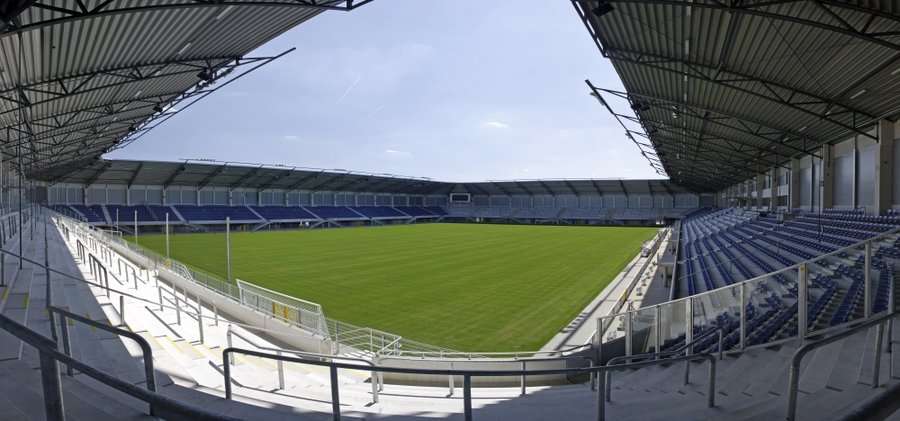In the Spring of 2016, SC Paderborn were facing the very real prospect of extinction. Their very status as a professional team was hanging in the balance, with the club in freefall following two quickfire relegations in as many seasons. The incredible part is that a couple of seasons prior, this unlikely group of plucky underdogs had dragged themselves into German footballs elite – achieving an historic promotion to the Bundesliga, for the first time in the clubs short, previously unspectacular history. And yet, just 2 years later, they were fighting for survival. How then, could this small-town North-Rhine Westphalian club, who only turned professional in 2005, possibly climb off the canvas – to once more gain promotion to Germany’s top division? It all begins back in the spring of 2016, with the appointment of an obscure German coach, who would reshape the history of Paderborn like no other.
With Paderborn now on the precipice of a second season in the Bundesliga, questions will naturally arise as to what the future holds, with pundits already predicting a swift return to the second tier. The story of Paderborn is a particularly noteworthy one – not merely for their recent endeavours moving through the leagues, but also because of their very new status as a professional club. Until 2005, Paderborn were essentially an amateur team. First formed in 1985, from two rival regional teams (TuS Schloss Neuhaus and FC Paderborn), SC Paderborn remained outside the professional ranks for 20 years before eventually creeping before a breakthrough in the mid 2000s. The 05/06 season saw a newly formed SC Paderborn step into 2. Bundesliga for the very first time, but not before a turbulent campaign that saw the club make national headlines. In 2005, Paderborn would find themselves at the centre of a match fixing scandal, after a DFB Pokal tie against Duisburg saw the games referee receive a bribe to let Paderborn win the match. The club (unlike the ref) would emerge from the scandal relatively unscathed, with only a reputational dent to recover from. Ironically though, this was to be the beginning of a relative period of stability for the club, after a tumultuous decade, with Paderborn remaining in 2. Bundesliga for the next 4 seasons.
In 2014 however, a breakthrough would finally be forthcoming, as the North-Rhine Westphalians finally achieved promotion to the Bundesliga. It was an historic campaign, the first time the newly formed SC Paderborn has reached the promised land of the Bundesliga. A remarkable story, given their short lifespan – as well as the controversy that had blighted the club in the years prior to their promotion. And yet, as the football finally got under way, the most remarkable thing occurred – Paderborn were top of the Bundesliga for the first month of the season. In a start reminiscent of Hull City’s explosive introduction to the Premier League in 2008, Paderborn burst straight out the gates – with a brand of exciting, attacking football to put the whole league on notice….for all of 6 weeks. And then, the inevitable happened. The squad, lacking in depth and genuine top tier quality, started a slow decline, one that would eventually result in finishing bottom of the Bundesliga. It was a mighty fall from grace, quintessentially Paderbornian – as hope fades before the inevitable demise. This alone, would be motivation enough for any set of players, or any manager, to do all they could to return Paderborn to the top flight. And yet, cruel fate intervened once more. As was mentioned in the introduction, Paderborn’s induction into Germany’s top division was followed up by one of the most remarkable collapses in the nations long and storied footballing history. From the Bundesliga to the third tier of German football in the space of 2 years is bad enough – but from there, to stand on the verge of expulsion from the professional ranks altogether – is truly remarkable.
The club’s status as a professional side was only saved by a remarkable stroke of luck elsewhere in Germany. As fate would have it, as Paderborn finished in the relegation zone of 3. Liga, so too did 1860 Munich in the division above, 2. Bundesliga. Paderborn’s saving grace, was that the DFB refused to grant 1860 Munich a licence to play in the third tier, essentially handing Paderborn a get out of jail free card in the process. As significant as this decision would prove to be, the club were also to be blessed with another piece of divine intervention, as Steffan Baumgart was drafted in, in a late attempt to selvage their slim hopes of remaining in 3. Liga. This attempt, while ultimately unsuccessful, encouraged the club’s hierarchy to keep the relatively unproven coach on board for the upcoming season. This decision, alongside DFB’s refusal to grant 1860 a licence, would profoundly alter the future of SC Paderborn, who – just 3 years later, are less than a month away from the clubs second ever season in the Bundesliga.
One of the most remarkable stats concerning last season’s 2. Bundesliga campaign is the wide disparity financially between the divisions haves and have nots. Financial estimations gathered from transfermarkt – while not irrefutable evidence – do provide us with a rough idea of the cost of each of the league’s 18 squads. Topping their list was, unsurprisingly, newly relegated FC Koln – at a combined total market value of £89 Million. Contrast this to Paderborn, who were bottom of the pile with a total value of just £265k. When one factors in the clubs financial limitations, alongside the fact that they were newly promoted from 3. Liga, you can begin to appreciate the scale of the job Baumgart did in getting Paderborn into the Bundesliga once more. It was a minor miracle, one that surely deserves more attention and appreciation that it thus far appears to be getting. Because it must be stated, that Paderborn’s unlikely return to the Bundesliga has been somewhat lost in the equally magical tale of Union Berlin’s promotion, which itself shares headlines with the return of division champions Koln. But perhaps Union’s promotion and fairy-tale debut season in the top flight could be blessing for Paderborn, who can now fly under the radar to an extent.
Paderborn’s squad last season was hugely reliant on their core starting 11, and within that XI, are key players for whom promotion simply wouldn’t have been possible without. Stats and fans alike will both tell you that two of the clubs best performers last year were talismanic central midfielder Phillip Klement, and exciting winger Bernard Tekpetey. Both, unfortunately for Paderborn, have already been sold this summer – to Stuttgart and Schalke respectively. It’s a bitter blow for Paderborn, who, just like in the summer of 2014, don’t have an excessive amount of funds to spend. Indeed, there’s an argument to be made that the club is essentially operating on a 3. Liga budget until the Bundesliga payments begin to trickle in. The sale of Klement is a particularly hard pill to swallow, given that the side he is being sold to – Stuttgart, is now about to play in the division Paderborn were just promoted from. It goes further than that however, Klement was a leader within the side, instrumental to everything Paderborn did well. He scored a remarkable 16 goals in the league, while also registering 7 assists. His influence is highlighted best by WhoScored’s 7.63 average rating, the highest of any Paderborn player last season – by some margin. Tekpetey’s loss, while not as jarring, is still surely a tough one to take, with the 22-year-old Ghanaian leaving for just £2.5 million, a pittance given his 10 goal tally, and relative young age. Tactically, both were key to Baumgart’s system, which, on the face of it, appears to be a fairly straight forward 4-4-2. And yet, the flexibility and intelligence of the system made Paderborn a real force last season, as the pre-season relegation favourites stormed to a famous promotion.
Via Whoscored
While stars may have departed, the core of the side, alongside the coach who got them this far, all still remain in place. That being said, Paderborn have it all to do if they want to remain in the Bundesliga, no matter how good Baumgart proves to be. With minimal funds to spend, the club have mainly relied on free transfers from lower division sides this summer, all while – as previously mentioned, having to sell key figures in the squad. Some money has indeed been spent in problem areas, with Mainz keeper Jannick Huth arriving last month, alongside Grasshoppers central midfielder Rifet Kapic, who may well be given the unenviable task of replacing Klement in the heart of the side. More business will surely be done, with some players still yet to be adequately replaced. And yet, regardless of who they sign, one thing is for certain – Paderborn will, once again, be the ultimate underdogs.
If any one side is worthy of your encouragement next season, I implore you to pick Paderborn, as their story in getting this far is unlike any in European football, let alone German. Yes, Union will steal the headlines, as their journey to the top is also a tremendous tale. In fact, I urge anyone who hasn’t yet read my colleague Axel’s piece on their historic promotion to do so. With that being said however, I feel that Paderborn are equally worthy of your encouragement and plaudits, and I don’t just say that because I studied there. They are, in many ways, the ultimate ‘Mittelstand’ club – hailing from a town with little in the way of footballing folklore, now eager to make up for lost time. There is an appreciation in these parts of the journey the club has been on, and of just how close they came to going out of the professional game altogether. If the town didn’t appreciate this side before, they most certainly do now. Walking the streets of Paderborn, you’re struck by the lack of football shirts, or footballing paraphernalia on show. It is not a sport hub per-se, like the nearby Dortmund or even Hanover – It’s a university town, with remnants of industry still In place. But in a region of footballing royalty – where, within an hour of driving, you can be at the Veltins, Westfalenstadion, or the Bay Arena, Paderborn will now surely want to take their place at the big boy table. This industrial hub, so pivotal and vital to German’s economic miracle, has yet another Mittelstand story to tell. In an era of Corporate branded clubs, and discussions over the very future of the Bundesliga’s unique ownership rules, perhaps stories like Paderborn will soon be a remnant of the past, a legacy of what German football once stood for – The last of the true “Dorfverein” (Village Club) miracles. So enjoy it, embrace the underdog, and when you undoubtedly go to check Union’s result, maybe just keep an eye out for SC Paderborn’s score as well. It won’t be easy, nor may it be pretty at times – but as ever, it is sure to be quite a ride at the Benteler Arena, for the Bundesliga’s latest Dorfverein inductee.
By Tom Fenton.










